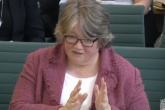Waste has ‘important role’ in UK’s new industrial strategy
Members of the waste and resources industry have welcomed the mention of the industry in the government’s new industrial strategy, unveiled today (23 January) by Prime Minister Theresa May, saying that creating markets for secondary materials and improving infrastructure can make an ‘important contribution’ towards the UK’s growth.
 May said that the government will be “stepping up to a new, active role” in industry as she launched a green paper, ‘Building our Industrial Strategy’, which sets out a plan to improve living standards and economic growth by increasing productivity and driving growth across the whole country.
May said that the government will be “stepping up to a new, active role” in industry as she launched a green paper, ‘Building our Industrial Strategy’, which sets out a plan to improve living standards and economic growth by increasing productivity and driving growth across the whole country.
As part of this plan, the government has created 10 strategic pillars to underpin the approach:
- investing in science, research and innovation;
- developing skills;
- upgrading infrastructure;
- supporting businesses to start and grow;
- improving procurement to drive innovation and enable supply chain development;
- encouraging trade and inward investment policy;
- delivering affordable energy and clean growth;
- cultivating world-leading sectors;
- driving growth across the whole country; and
- creating the right institutions to bring together sectors and places.
The paper says that the government will ‘work with stakeholders to explore opportunities to reduce raw material demand and waste in our energy and resource systems, and to promote well-functioning markets for secondary materials, and new disruptive business models that challenge inefficient practice’.
A consultation has also been launched alongside the paper to gather evidence on which priorities the industrial strategy should take and what challenges face its development.
‘Important contribution’ of waste and resource management
The launch of the strategy has been well received within the industry, with both the Chartered Institution of Wastes Management (CIWM) and SUEZ recycling and recovery UK noting the industry’s place in delivering the government’s goals.
“Now is an opportune time for the UK government to put forward a long-term vision for its industrial strategy”, said CIWM CEO Dr Colin Church. “It is particularly encouraging to see resource productivity identified as important to the competitiveness and resilience of the UK economy.”
He added: “There are also important strands in the paper that are directly relevant to our sector, not least the focus on innovation and science. The UK waste and resource management sector has shown itself to be dynamic and innovative in developing new ways of deriving value from waste – both as secondary materials and energy – and has the potential to become a valuable source of feedstocks for industrial growth sectors, including the UK bioeconomy.
“In seeking to ‘secure the economic benefits of our move towards a low-carbon economy’, the Prime Minster and her colleagues must also not forget the important contribution that the waste and resource management sector makes to tackling climate change, both in terms of reducing the UK’s greenhouse gas emissions and reducing the impact associated with the extraction and consumption of virgin raw materials.
“This contribution must be reflected in any strategy seeking to deliver low-carbon growth and must be planned for as part of the infrastructure upgrade that has been promised today. In addition, given its very nature, waste and resource management happens at a local as well as a national level and is an important component in the Prime Minister’s drive to secure local economic development across the UK.”
Waste must be ‘treated fully as a resource’
Waste management firm SUEZ was also quick to highlight resources and waste management’s ‘vital role’ in developing resilient UK supply chains and securing the economic benefits of a low-carbon, resource-efficient economy.
Saying the company is committed to making future investments that help transform the UK’s recycling infrastructure and address “the structural deficit in UK energy production”, David Palmer-Jones, CEO of SUEZ recycling and recovery UK, said: “We look forward to seeing the resources and waste management sector embedded in the government’s strategy for upgrading infrastructure, investing in affordable energy and clean growth, while also ensuring that the secondary raw materials our sector produces [support] the UK economy along the path of innovative and sustainable growth.
“A modern industrial strategy heralds a modern strategy for the resources and waste management sector. We will work with government to ensure waste is treated fully as a resource for both secondary raw materials and energy, so that we in the private sector can continue to invest in the long-term infrastructure required to help transition the UK to a more fully circular economy, improving resource productivity.”
The green paper notes that work on resource efficiency and secondary raw materials would be supported by the Department for Environment, Food & Rural Affairs’ (Defra) long-awaited and long-delayed 25-year plan, ‘which will set out a long-term vision for delivering a more resource-efficient and resilient economy’.
Need to boost investor confidence
Chair of the Environmental Audit Committee, Mary Creagh MP, sounded a note of caution based on government’s previous actions in the realm of sustainability, though, saying: “Sudden changes to the government’s green policies during the last spending review damaged investor confidence. The government needs to use today’s industrial strategy to set out how it will make Britain’s green energy, green infrastructure and green transport world leading.”
The government’s ‘Building Our Industrial Strategy’ green paper can be read and downloaded from the Department for Business, Energy and Industrial Strategy’s website.









